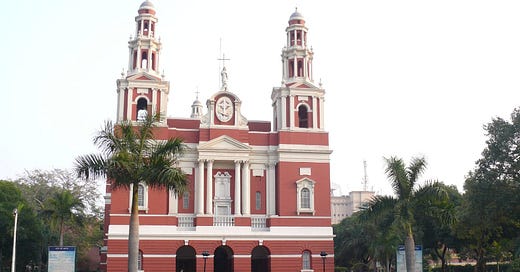
Delhi police bar the Way of the Cross
Catholics in the Delhi archdiocese expressed 'deep shock' after police denied them permission for an annual Way of the Cross procession.
Catholics in the Delhi archdiocese expressed “deep shock” Sunday after police denied them permission for an annual Way of the Cross procession through the streets of the Indian capital.
The Catholic Association of the Archdiocese of Delhi said April 13 that the event, held for more than a decade on Palm Sunday, could not go ahead after the Delhi Police cited “law and order and traffic concerns.”
Organizers reportedly sought police permission for the event March 12, but were informed April 12 — on the eve of the procession — that it could not go ahead.
Another Palm Sunday procession, led by the Christian Youth League and inaugurated by the Anglican bishop of Delhi, took place as usual in the city.
The Catholic association, a registered body representing local Latin Catholics, said its members were “deeply hurt and disappointed” by the decision to block the procession, which begins at St. Mary’s Church, one of the city’s oldest churches, and ends at the Latin Rite Sacred Heart Cathedral.
Each year around 2,000 Catholics meditate on the 14 Stations of the Cross along the approximately three-mile route.
The association said the police’s reasons for denying permission were “difficult to accept,” because other communities and political groups were frequently allowed to hold processions and rallies in the city, even at peak times.
“For over a decade, the annual Way of the Cross has been conducted with utmost discipline, peace, and full cooperation with the authorities. Not once has there been a report of traffic disruption or law and order issue linked to our event,” it said.
“The denial of permission this year feels biased and unfair, casting a shadow on the principles of equal treatment and religious freedom.”
Organisers reportedly held the Way of the Cross procession in the cathedral’s grounds, respecting the police ruling.
The street procession’s cancelation created ripples in India’s political world.
K.C. Venugopal, a senior leader of the Indian National Congress, the main opposition party, criticized the decision in an April 13 letter to India’s home affairs minister Amit Shah, a member of the ruling Bharatiya Janata Party.
While Shah has overall responsibility for the Delhi Police, it is unclear whether he was involved in the decision to refuse permission for the procession. Indian media said the Delhi Police did not respond to requests for comment.
The BJP, a Hindu nationalist party, won the Delhi Legislative Assembly elections in February, returning to power in the territory after a 27-year absence.
In his letter to Shah, Venugopal wrote that “denying permission without concrete reasons raises questions about the government’s commitment to upholding the fundamental right to practice and profess one’s religion freely.”
He added: “This isn’t mere oversight; it’s a deliberate act of suppression. The government’s refusal to offer even a shred of credible reasoning for this ban lays bare its motives: discrimination dressed up as policy.”
Pinarayi Vijayan, the Chief Minister of Kerala, the Indian state with the largest Christian population, also lamented the decision.
“Such actions, which undermine the religious beliefs of minorities, are not in line with a pluralistic society,” said Vijayan, a member of the politburo of the Communist Party of India (Marxist).
India’s Catholics have a complex relationship with the BJP, which insists that Hindutva, or “Hindu-ness,” is the bedrock of the country’s culture. While the Catholic minority is generally wary of the party, the bishops recently backed a government bill reforming regulations on Islamic charitable endowments.
The bishops said they wanted to secure justice for Christian families on land claimed as an Islamic endowment in India’s southern Kerala state, but critics argued that the bishops’ support could harm Catholic-Muslim relations.
Shortly after the bishops’ intervention and the bill’s successful passage through parliament, the Hindu nationalist Organiser magazine published an online article urging the government to focus next on land owned by the Catholic Church.
The Telegraph said the article “appeared to be setting the agenda for a similar move aimed at the Catholic Church.”
The Organiser removed the article following a backlash.
There are around 77,000 Catholics in the Delhi archdiocese, out of a total population of almost 30 million.
The Sacred Heart Cathedral occupies a prominent site in New Delhi, the seat of India’s government. The country’s Prime Minister Narendra Modi, a BJP member, visited the cathedral at Easter in 2023. He attended a Christmas celebration in 2024 at the headquarters of the Catholic Bishops’ Conference of India, also in New Delhi.
The advocacy group Open Doors ranked India as the 11th-worst country in the world in which to be a Christian in its 2025 World Watch List of nations where Christians face high levels of persecution.












Thanks Pillar for reporting on this . One reason I am a paying subscriber
This is how serious persecutions begin. How long will it take before the government decides to scapegoat Catholics for any issue that it deems worthy of Catholic persecution? Follow the Nero and subsequent tyrannical government playbook.